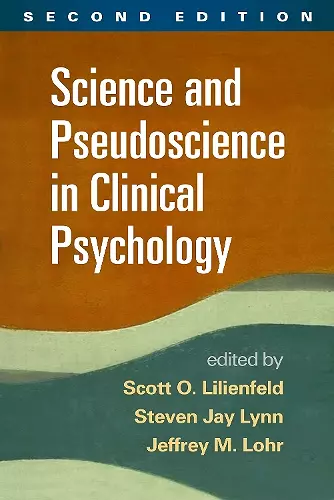Science and Pseudoscience in Clinical Psychology, Second Edition
Scott O Lilienfeld editor Steven Jay Lynn editor Jeffrey M Lohr editor
Format:Hardback
Publisher:Guilford Publications
Published:5th Feb '15
Currently unavailable, our supplier has not provided us a restock date
This hardback is available in another edition too:
- Paperback£56.99(9781462517893)

This valued resource helps practitioners and students evaluate the merits of popular yet controversial practices in clinical psychology and allied fields, and base treatment decisions on the best available research. Leading authorities review widely used therapies for a range of child, adolescent, and adult disorders, differentiating between those that can stand up to the rigors of science and those that cannot. Questionable assessment and diagnostic techniques and self-help models are also examined. The volume provides essential skills for thinking critically as a practitioner, evaluating the validity of scientific claims, and steering clear of treatments that are ineffective or even harmful.
New to This Edition
*Reflects the significant growth of evidence-based practices in the last decade.
*Updated throughout with the latest treatment research.
*Chapter on attachment therapy.
*Chapter on controversial interventions for child and adolescent antisocial behavior.
*Addresses changes in DSM-5.
"In an age when everyone in clinical psychology claims that their practices are based on scientific evidence, it is imperative that we know what scientific evidence means and how to use it--but that task is not always as easy as it may seem. The second edition of this stunningly good book walks us through the major controversies in our field and methodically discerns fact from myth. Thoroughly updated throughout, and with new chapters on attachment therapies and questionable treatments for childhood and adolescent antisocial behaviors, this book should be required reading for every student of clinical psychology."--David H. Barlow, PhD, ABPP, Professor Emeritus of Psychology and Psychiatry and Founder, Center for Anxiety and Related Disorders, Boston University
"Using controversies in diagnosis, assessment, and treatment with adults, adolescents, and children as an organizing structure, this book addresses the state of the science in psychotherapeutic practices across diagnostic categories and populations of interest. Without defensiveness or agenda, the contributors take on the disconnect between those who conduct therapy in ways rooted in questionable logic and idiosyncratic intuitions and those who strive to honor the basic ideas of research-based applications and scientific thinking. They also promote awareness of common cognitive biases and intellectual errors that even the most skeptical of us frequently fall prey to. In a world screaming for trustworthy evidence to inform professional practice, this book busts myths and feeds intellectual humility. At the same time, it provides accurate, solid, satisfying answers about what we really know--and don't know--right now."--Kia J. Bentley, PhD, LCSW, School of Social Work, Virginia Commonwealth University
“This book, which details the sloppy thinking that results in some mental health professionals adopting invalid assessment and intervention approaches, will be valuable for students, practitioners, and educators. Readers will become more critical consumers of what is offered as science-based mental health practice. Educators will find the volume helpful with respect to teaching the scientific method and critical thinking skills to their students.”--Randy K. Otto, PhD, ABPP, Department of Mental Health Law and Policy, University of South Florida
"An important book. There is an increasing emphasis on 'evidence-based' assessment and therapy, but science can be used either substantively or rhetorically--this book does an excellent job of distinguishing the two in a clinically relevant way. Those who sell illegitimate pseudoscientific therapies to people in distress violate the moral imperative of 'first do no harm.' The updated second edition captures the key current controversies and has a roster of impressive chapter authors. A 'must read' for behavioral health professionals."--William O'Donohue, PhD, Department of Psychology and Director, Victims of Crime Treatment Center, University of Nevada, Reno
"Courageously confronting myths and misinterpretations in a wide range of clinical psychology practices, this second edition conveys important knowledge in a very readable format. In addition to expert updates on existing chapters, there are several new chapters that I find particularly valuable. The chapter on attachment therapy provides much-needed corrections to dangerous misunderstandings, and the chapter on the science of psychotherapy has been largely rewritten, making powerful new points. This is essential reading for all practitioners and students."--Sherryl H. Goodman, PhD, Samuel Candler Dobbs Professor of Psychology, Emory University; Editor, Journal of Abnormal Psychology
"A needed text that can be a valuable asset to students, practitioners, and academics alike. There is an ongoing need to be committed to the scientist-practitioner model and to not be influenced by unsupportable and unproven public opinion and pop-psychological beliefs. This book continues to be instructive in these areas. It is essential reading for any graduate program in clinical psychology dealing with psychotherapy….It is well-priced, containing current research on what is and isn't empirically validated. It will make selection of a specific therapeutic procedure a more thoughtful and helpful process."--Child and Family Behavior Therapy
"While the contributors offer compelling and balanced criticisms of these techniques on scientific grounds, the true merit of the text is that it takes preliminary steps to understand why pseudoscience exists and persists in the 21st century....I would highly recommend it for practitioners, clinical researchers, and graduate students in clinical psychology, social work, or counseling." (on the first edition)--Journal of Psychosomatic Research
"Represents a most welcome attempt to separate the wheat from the chaff in mental health practices. This engaging, incisive, and illuminating book should be widely read by mental health professionals and trainees and by physicians needing to refer patients for mental health care." (on the first edition)--Journal of the American Medical Association
ISBN: 9781462517510
Dimensions: unknown
Weight: 940g
548 pages
2nd edition